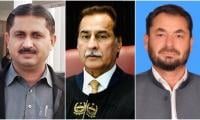ISLAMABAD: The Troika Plus, in its ninth meeting, held after a gap of three months on Thursday, sent a loud and clear message to the caretaker Afghan government to take a friendly approach towards neighbouring countries.
The meeting asked Afghanistan to uphold its international legal obligations, including universally accepted principles of international law and fundamental human rights, and protect the safety and legitimate rights of foreign nationals and institutions on its lands.
The Troika Plus on Afghanistan was attended by Ambassador Mohammad Sadiq, Pakistan’s special representative for Afghanistan, Thomas West, the State Department’s special representative and deputy assistant secretary for Afghanistan, Russia’s special envoy for Afghanistan Zamir Kabulov and Chinese special envoy for Afghanistan, Yue Xiaoyong, at the Foreign Office.
This is the first visit of Thomas West to Pakistan after he took over from Zalmay Khalilzad. Pakistan at the Troika meeting, without naming the United States, said efforts should be made to enable Afghanistan to access its frozen funds which would dovetail into efforts to regenerate economic activities and move the Afghan economy towards stability and sustainability.
The United States is holding on to billions of dollars which were parked in American banks during the government of former president Ashraf Ghani.
Prime Minister Imran Khan said Pakistan had always stood by the Afghan people in their time of need and urged the international community to fulfil its collective responsibility and do the same.
The prime minister’s remarks came amid a visit to Islamabad by acting Afghan foreign minister Amir Khan Muttaqi, who was extended an invitation to attend the Troika Plus meeting.
"We have assured [Muttaqi] and his delegation we will provide all possible humanitarian aid to Afghanistan. We are sending essential food items, emergency medical supplies and winter shelters to provide immediate relief to Afghan people," he wrote.
The premier followed by saying that free COVID-19 vaccines will be administered to all Afghans travelling across the border into Pakistan. "Again I urge the international community to fulfil its collective responsibility to avert a grave humanitarian crisis confronting the people of Afghanistan," PM Imran Khan said.
Foreign Minister Shah Mehmood Qureshi addressed the opening session of the meeting and a joint statement was issued at conclusion of the meeting. Later, an Afghan delegation, led by its caretaker foreign minister Amir Khan Muttaqi, held delegation level talks with Qureshi, who headed Pakistan’s delegation at the Foreign Office.
“Pakistan has highlighted to the Taliban the international community’s expectations of them. “We believe Taliban are interested in engagement, as they seek international acceptance and support.
“It is, therefore, crucial that the international community avoids repeating mistakes of the past and continues with positive engagement,” said Qureshi. Looking back at the time when the US left Afghanistan, there were a lot of apprehensions including the breaking out of a civil war.
“The redeeming factors were: no bloodshed; much dreaded mass exodus of new refugees did not occur; encouraging announcement from Taliban on future steps and, most importantly, international community has remained engaged,” said the foreign minister.
Nobody, he added, wishes to see a relapse into civil war; no one wants an economic collapse that will spur instability; everyone wants terrorist elements operating inside Afghanistan to be tackled effectively, and; we all want to prevent a new refugee crisis.
Of importance were Qureshi’s remarks on the economy of Afghanistan, which he said stands at the brink of an economic collapse, and with international funding dried up, it has become difficult to pay even salaries, let alone pursue development projects.
“Any further downward slide will severely limit the new administration’s capacity to run the government. “It is, therefore, imperative for the international community to buttress provision of humanitarian assistance on an urgent basis,” he added.
Meanwhile, the joint statement from the Troika sent out a loud message to Kabul, regional countries and world capitals. Addressing the Taliban, it said that it had expectations that they would take decisive action against terrorists, fulfil their commitment to prevent use of Afghan territory against its neighbours, and other countries in the region and the rest of the world.
As foreign capitals had complained of distributing humanitarian aid, the Troika called on Taliban to ensure unhindered humanitarian access, including by women aid workers, for the delivery of humanitarian assistance in Afghanistan to respond to the developing crisis.
The Taliban were also asked to work with fellow Afghans to take steps to form an inclusive and representative government that respects the rights of all Afghans and provides for equal rights of women and girls to participate in all aspects of Afghan society.
In this regard, it was emphasised that access to education for women and girls at all levels is an international obligation and encouraged Taliban to accelerate efforts to provide for full and equal access to education countrywide.
The Troika declared that they would continue to hold practical engagement with the Taliban to encourage implementation of moderate and prudent policies that can help achieve a stable and prosperous Afghanistan as soon as possible.
Of importance was the Troika recalling the relevant Afghan-related UNSC Resolutions, including respect for the sovereignty, independence and territorial integrity of Afghanistan that is free of terrorism and drug related crime, and that contributes to regional stability and connectivity.
Saad was of the view that the battle of politics should be fought solely through political means
KP govt decided to develop gemstone business as a formal export sector and cluster at the Namak Mandi would be...
Khyber Pakhtunkhwa Minister for Higher Education, Archives, and Libraries, Meena Khan Afridi. — APP FilePESHAWAR:...
Vehicles and horse carts passing through flood water at Bara Bazar area on Khuwani bridge after heavy rain in Peshawar...
Amid the failure to revive the cash-bleeding PIA, government is left with no other option but to sell it to any...
Picture showing the Silver Jubilee Gate of the University of Karachi. — APP File KARACHI: The University of Karachi...







